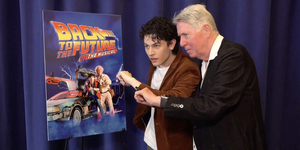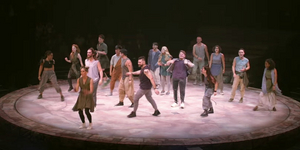Feature: EDDIE: THE FRIENDSHIP THAT CHANGED HISTORY at White Theatre
Don't miss Eddie, a one-man play starring Victor Raider-Wexler, at the White Theatre.
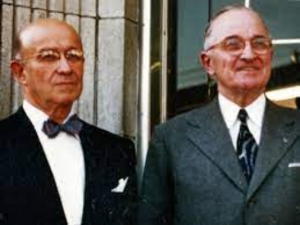
President Harry S. Truman -
A Friendship That Changed History
On the occasion of the 75th Anniversary of the establishment of the State of Israel, a not commonly cited friendship, between President Harry S. Truman and a Kansas City friend may well have had an outsized influence on the success of the new tiny country. That man was Eddie Jacobson, Truman's close friend since 1905. Both Truman and Jacobson served in the same World War I artillery unit, became business partners, and remained lifelong friends.
A one-man play, "EDDIE," by Bob Feinberg and Marvin Starkman will be staged May 13 and 14 on the stage of the White Theatre at the Jewish Community Center in Overland Park. EDDIE stars veteran Kansas City character actor Victor Raider-Wexler as the title character. Audiences will recognize Raider-Wexler from a long career in film and television in addition to his theatre work. The show is directed by White Theatre Managing Artistic Director Keith Wiedenkeller and New Theatre CEO Dennis Hennessy. The sponsor of the production is the Truman Library.
EDDIE is premised as a reunion of the Artillery Company in which both Truman and Jacobson served during the Great War. Harry Truman is not present. He has a job to complete in Washington. The speaker for the evening is Eddie Jacobson.
Eddie's talk speaks mainly to a time following World War II and leading up to spring, of 1948 when the destiny of thousands of Jewish Holocaust survivors remained in doubt. Displaced persons lived in camps sprinkled around Europe. Lives and families had been devastated by the Nazis and their collaborators. There was no place for them to return.
A 1945 report to President Truman had suggested that the displaced be re-located distributed to Palestine, the United States, and other countries. Palestine had been under control of the British mandate since the end of the First War. They wanted out from under the responsibility.
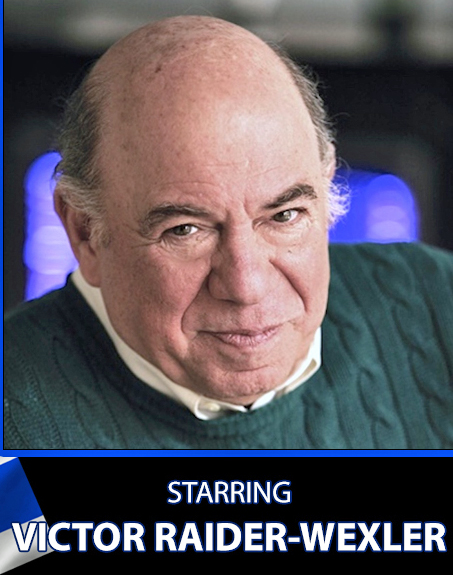
For geopolitical reasons, Britain became the guardian of historical Palestine following The Great War. Britain, then in competition with the French and the Italians, agreed to govern Palestine. British Foreign Minister Arthur Balfour declared (in a letter to Jewish banker Baron Lionel Rothchild) UK governmental support for a Jewish homeland in Palestine. Balfour's Declaration and a later mandate from The League of Nations created a no-win situation for Britain. Unfortunately, the Balfour Declaration was not fully thought through.
Between the World Wars, waves of Jewish refugees descended on Palestine and the British operated government floated the idea of a "national home for the Jewish people." The Zionist ideal was spreading through the Pale of Settlement. Conflict erupted almost immediately between the previous Arab occupants of Palestine and the new immigrants.
Resistance from the Arabs and some Christians caused the British to impose an annual cap on Jewish immigration to the Holy Land and further to unfairly allocate tillable ground to Arab interests. The situation was clearly untenable for the Brits. They had a need for Arab energy and no desire to make enemies in the Middle East. Further, they had devoted a 90,000 man army to Palestine in an unsuccessful effort to keep the peace. They wanted out from under the Palestine burden.
The Zionist idea is credited with having been founded in the mid 1890s by Theodore Herzl, a Hungarian Jewish lawyer and Journalist. Herzl had covered the anti-sematic court martial trial of Alfred Dreyfus in Paris. Dreyfus was unfairly cashiered from the French army because he was a Jew. Herzl speculated that the only place safe from anti-Jewish discrimination might be a Jewish homeland. Herzl died in 1904, but his idea lived on and took hold.
America has had historical inward looking immigration impulses since the mid-nineteenth century. There was resistance to Irish, Italian, and other groups. In 1882, a law was passed limiting immigration from Asia. A quota system by countries was imposed in the 1920s.
Illinois veteran and Congressman William Stratton proposed an exception be made for 400,000 displaced persons from the war. Most would have presumably been Jewish survivors. It was reasoned that existing Jewish Americans would take the newcomers under their wing and ensure that they were not likely to become public burdens. Stratton's legislation went nowhere.
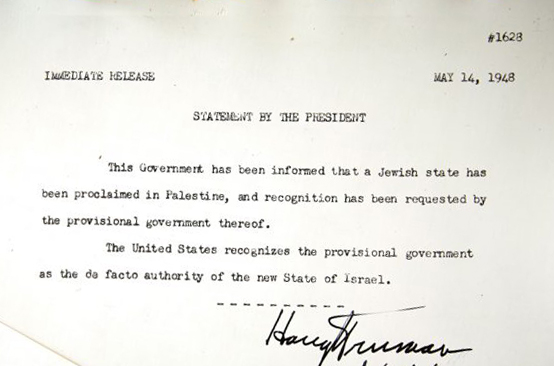
The United States recognizes the state
of Israel eleven minutes after it was requested.
A bill authorizing an additional 200,000 refugees to the United States eventually passed. Many of the candidates for relocation came from eastern European countries. This raised fears that many could be Communist spies. Emigration was made purposely difficult. Many of the DPs lived in camps in what had become the Soviet Sphere of Influence and immigration for them became difficult.
In 1947 and 1948, Harry Truman faced a challenging reelection campaign. World War II was over, but the transition to peacetime made Truman unpopular. He faced a difficult opponent in Republican candidate Thomas Dewey. The Red Scare bloomed as competition with the Soviet Union grew more intensive. Southern Democrats opposed the Truman's desegregation of the military and the government workforce.
The horror of the WWII death camps and their six-million mostly Jewish victims was already beginning to fade. The Nuremburg War Crimes trials were in the rear view mirror. The surviving Jews of Europe remained homeless. Many lived in displaced persons encampments. There was a question of where these survivors might be welcome.
President Truman had empathy for the homeless and intense pressure from American Jewish leaders to support a Jewish Homeland in Palestine. There was also intense resistance from inside the U.S. State Department.
The State Department was loathe to support anything that could start another war involving US troops. Their first priority was continuing access to fuel supplies in the Middle East, followed by a desire not to offend either existing governments in that region or World War II Allies in Europe. While it is impossible to attribute motives from this distance, opponents noted how outnumbered the Jewish settlers would be compared to the thirty million Arabs arrayed against them. They feared being asked for support if the battle went badly for the Palestinian Jews after the European bloodbath.
But the straw that broke the camel's back was carried into the Oval by a Rabbi Abba Hillel Silver who made the mistake of pressing home his point by pounding on the presidential desk. Harry Truman, who also owned a famously salty temper, had had enough. From that point on, Truman refused to discuss the matter any further especially with representatives of the Zionist leadership. He refused to meet with the future President of Israel Chaim Weizman. A stalemate had been reached.
The long, personal friendship between President Harry Truman and Kansas City businessman Eddie Jacobson was known by Jewish leaders. Jacobson owned a menswear store in Westport. He was not political. He was not even a Zionist, but he was aware and appalled by what had been done to the Jews under the Nazis..
Desperate for a new approach, Frank Goldman, the national President of B'nai Brith telephoned Eddie Jacobson in the middle of the night on February 20, 1948 and asked for help. He asked Jacobson facilitate a meeting between Truman and Dr. Chaim Weizman. Eddie Jacobson agreed to try. He wrote a letter to his friend.
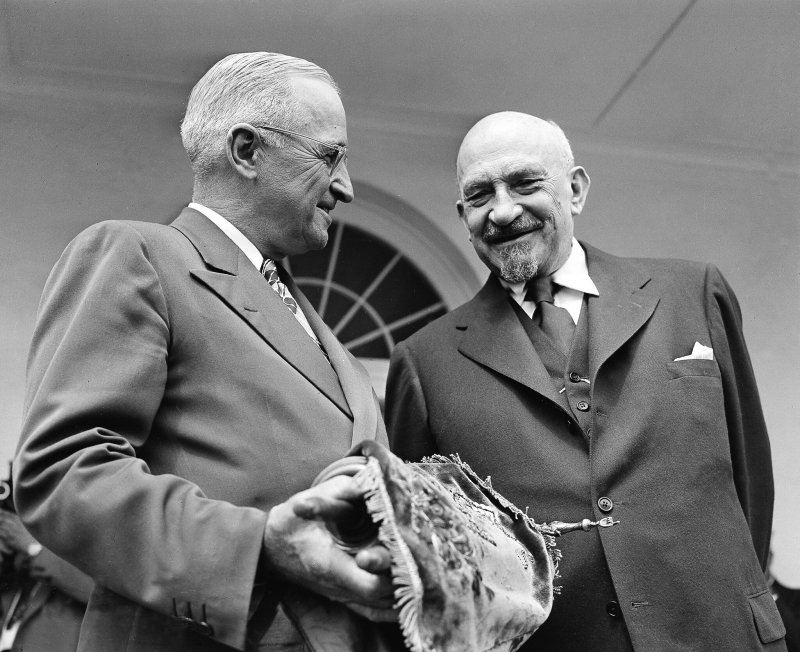
with Israeli President Chaim Weizman
at the White House In Washington
President Truman was on vacation in Florida. Truman always responded to Eddie. A letter from Florida less than a week later was not encouraging. Eddie knew President Truman was unlikely to change his mind.
Truman was stuck in a box between his own feelings, State Department arguments, a lack of majority Congressional support, vociferous Jewish-American pressure, a challenging election campaign, and a looming British pullout.
The United Nations was in its infancy. While a plan for partition of Palestine into two countries was approved by the UN General Assembly in 1947, no charter authority to raise a policing force existed to assure the peace.
Eddie Jacobson decided the only way to get a positive response on a Weitzman meeting was for him to visit Harry Truman in person. He did so, unannounced, on March 12, 1948. Eddie took the day off from his menswear store in Westport, flew to Washington, and presented himself at the White House gate. He was quickly shown into the executive offices and allowed into the Oval Office. Harry was behind the Resolute Desk and the iconic plaque that proclaimed "The Buck Stops Here."
Washington was a much different place in 1948. A visitor's White House tour (even a few years back) requires an advance FBI background check and at least two Secret Service checkpoints before visitors are allowed into the People's House. You don't ever get close to the West Wing or the upstairs residence.
Truman's gatekeeper warned Jacobson not to raise the Palestine issue, but Eddie did not beat around the bush. Truman rebuffed almost all the arguments his friend put forward. He had never seen Truman so set in place, nor so bitter towards him.
Eddie knew that Truman's personal hero was Andrew Jackson. Truman had made himself a scholar on Jackson. In a last ditch appeal, Eddie compared Jackson, Truman's hero with Chaim Weizman, who was Eddie's personal hero. In short, Eddie put his forty year friendship with Truman on the line.
The President drummed his fingers on the desk. He swiveled his chair and stared out the window into the Rose Garden. Time passed in slow motion. He turned back to his friend.
"You Win, You bald headed son of a bitch. I will see him. Tell Matt to arrange the meeting as soon as possible after I return from New York," said a resigned Harry Truman.
Weitzman and Truman secretly met. The meeting went on far past its scheduled time. Truman committed to the future (and as yet un-named) nation of Israel.
In a last attempt to stop recognition, the US State Department pushed a proposal that would have established a UN trusteeship over Palestine. This solution was opposed by all the affected parties in the area. This new statement of U.S. policy was made by U.N. Ambassador Warren Austin without Truman's knowledge. Truman was vilified in the press.
President had just met secretly with Chaim Weizman twenty-four hours previous and assured the Jewish scientist and statesman that the new Jewish state would be swiftly recognized. Whether or not the State Department caught wind of Truman's commitment is debatable, but the President was furious.
Truman called a meeting on May 12th in the Oval Office. Present was Truman's entire foreign policy team Secretary of State George Marshal, Robert Lovett, Dean Acheson, Charles Bowen, George Kennan, James Forrestal, Dean Rusk, and Domestic Advisor Clark Clifford. The State and Defense Departments were given their opportunity to make their case for a UN trusteeship. The floor was then given over to Clark Clifford.
State Department officials objected to Clifford's participation. "Why is the domestic advisor here," demanded General Marshall. "Well, General, he is here because I asked him to be here," Truman bluntly replied.
An extended argument followed.
Truman ended the meeting. He said he was fully aware of the dangers in the situation, to say nothing of the political factors involved on both sides of the problem; these were his responsibility, and he would deal with them himself.
The next day Clifford was contacted by a representative of the State Department with a statement from General Marshal. "Clark, I think we have something we can work with. I have talked to the General. He cannot support the President's position, but he has agreed that he will not oppose it."
On Friday, May 14, 1948 Israel declared its independence. Harry Truman recognized the new country eleven minutes later.
EDDIE will be performed at the White Theatre inside the Jewish Community Center in Overland Park. Tickets are available at the White Theater box office or by telephone at 913-327-8054. Tickets are also available online at www.thejkc.org.
Following both performances, there will be a facilitated discussion with a historian from the Truman Library, Raider-Wexler, and Kansas City Community Shalicha Noa Dovrat. In addition, thanks to the support of the Truman Library Institute, The J will be hosting the traveling exhibit "Harry S. Truman and the Birth of Israel," which will be on display in the theater lobby through May 20..
For those interested in learning more.
Clark Clifford's complete account of the May 12, 1948 meeting in the Oval Officer is available online.
https://jcpa.org/article/president-truman%E2%80%99s-decision-to-recognize-israel/
Eddie Jacobson's 1952 15 page letter to Joseph Cohn at the Industrial Institute of Israel documenting his role with President Harry Truman in the recognition of Israel can also be seen online.
https://www.jewishvirtuallibrary.org/eddie-jacobson-recounts-his-role-in-influencing-truman-to-support-jewish-state
Videos
![#repshow# in #getregions.name[i]#](https://cloudimages.broadwayworld.com/regionalshows/ndC70EA094-B44F-4959-B954ABFAE6AB2D3A.jpg) |
A Man of No Importance Olathe Civic Theatre Association (6/23-7/09) |
|
![#repshow# in #getregions.name[i]#](https://cloudimages.broadwayworld.com/regionalshows/nd08ECF870-BD28-443D-BA1CEE0FF2AE939E.jpg) |
Something Rotten Theatre Lawrence (6/09-6/25) |
|
| VIEW ALL SHOWS ADD A SHOW | ||
Recommended For You
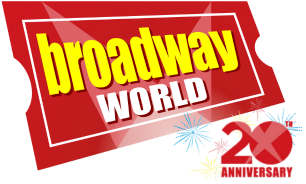





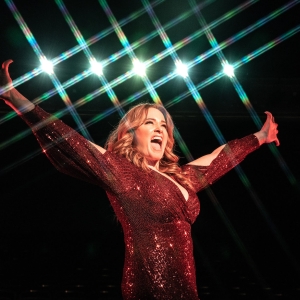
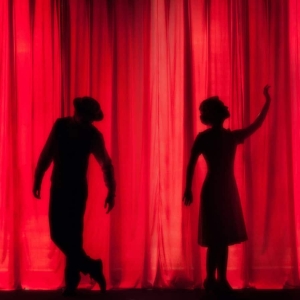
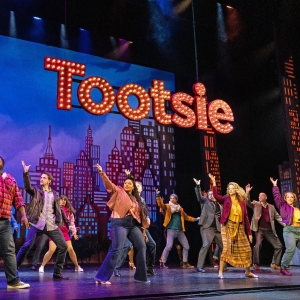
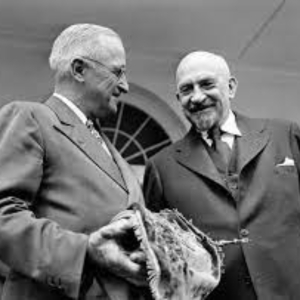
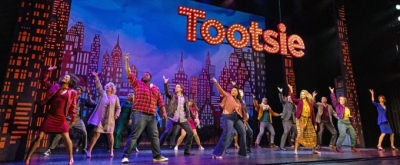
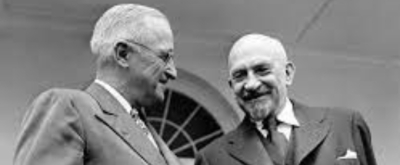
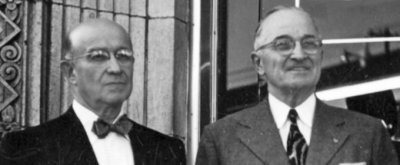
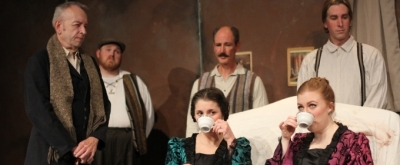
 Shucking Around with Ashley D. Kelley: SHUCKED Hits the Recording Studio
Shucking Around with Ashley D. Kelley: SHUCKED Hits the Recording Studio
